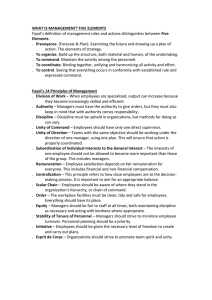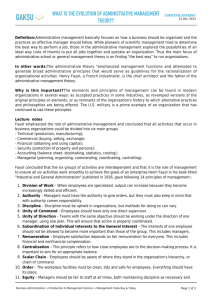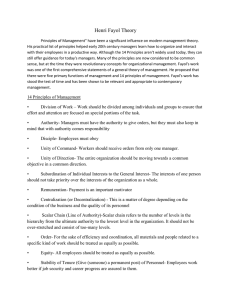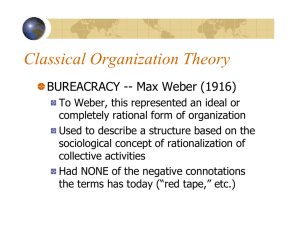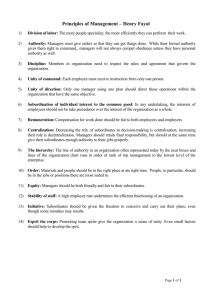Introduction to Management: Concepts, Objectives & Principles
advertisement
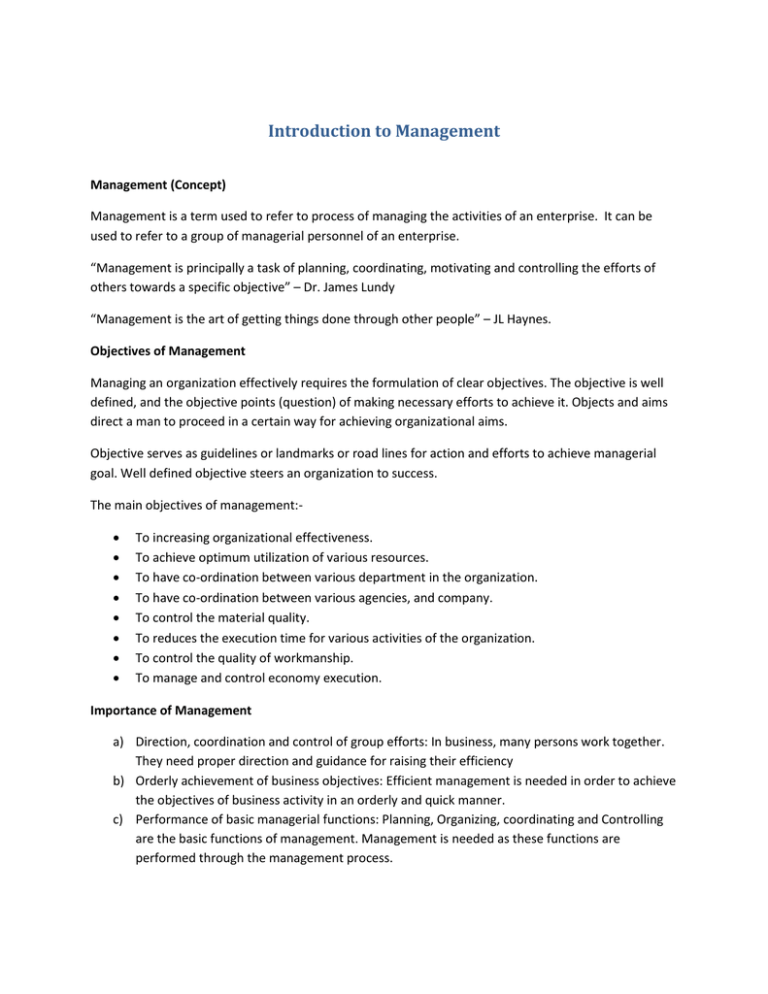
Introduction to Management Management (Concept) Management is a term used to refer to process of managing the activities of an enterprise. It can be used to refer to a group of managerial personnel of an enterprise. “Management is principally a task of planning, coordinating, motivating and controlling the efforts of others towards a specific objective” – Dr. James Lundy “Management is the art of getting things done through other people” – JL Haynes. Objectives of Management Managing an organization effectively requires the formulation of clear objectives. The objective is well defined, and the objective points (question) of making necessary efforts to achieve it. Objects and aims direct a man to proceed in a certain way for achieving organizational aims. Objective serves as guidelines or landmarks or road lines for action and efforts to achieve managerial goal. Well defined objective steers an organization to success. The main objectives of management: To increasing organizational effectiveness. To achieve optimum utilization of various resources. To have co-ordination between various department in the organization. To have co-ordination between various agencies, and company. To control the material quality. To reduces the execution time for various activities of the organization. To control the quality of workmanship. To manage and control economy execution. Importance of Management a) Direction, coordination and control of group efforts: In business, many persons work together. They need proper direction and guidance for raising their efficiency b) Orderly achievement of business objectives: Efficient management is needed in order to achieve the objectives of business activity in an orderly and quick manner. c) Performance of basic managerial functions: Planning, Organizing, coordinating and Controlling are the basic functions of management. Management is needed as these functions are performed through the management process. d) Effective communication at all levels: Management is needed for effective communication within and outside the Organization. e) Motivation of employees: Management is needed for motivating employees and also for coordinating their efforts so as to achieve business objectives quickly. f) Success and stability of business enterprise: Efficient management is needed for success, stability and prosperity of a business enterprise. Management and Administration Basis Management Administration Meaning Management is an art of getting things done through others by directing their efforts towards achievement of pre-determined goals. It is concerned with formulation of broad objectives, plans & policies. Nature Management is an executing function. Administration is a decision-making function. Process Management decides who should as it & how should he dot it. Administration decides what is to be done & when it is to be done. Function Management is a doing function because managers get work done under their supervision. Administration is a thinking function because plans & policies are determined under it. Skills Technical and Human skills Conceptual and Human skills Level Middle & lower level function Top level function According to Theo Haimann, “Administration means overall determination of policies, setting of major objectives, the identification of general purposes and laying down of broad programmes and projects”. It refers to the activities of higher level. It lays down basic principles of the enterprise. According to Newman, “Administration means guidance, leadership & control of the efforts of the groups towards some common goals”. Whereas, management involves conceiving, initiating and bringing together the various elements; coordinating, actuating, integrating the diverse organizational components while sustaining the viability of the organization towards some pre-determined goals. In other words, it is an art of getting things done through & with the people in formally organized groups. Principles of Management (1) Division of Work: This principle of Fayol tells us that as far as possible the whole work should be divided into different parts and each individual should be assigned only one part of the work according to his ability and taste rather than giving the whole work to one person. (2) Authority and Responsibility: According to this principle, authority and responsibility should go hand in hand. It means that when a particular individual is given a particular work and he is made responsible for the results, this can be possible only when he is given sufficient authority to discharge his responsibility. (3) Discipline: Discipline is essential for any successful work performance. Fayol considers discipline to mean obedience, respect for authority, and observance of established rules. Discipline can be established by providing good supervision at all levels, clearly explaining the rules, and implementing a system of reward and punishment. A manager can present a good example to his subordinates by disciplining himself. (4) Unity of Command: According to the principle of unity of command, an individual employee should receive orders from only one superior at a time and that employee should be answerable only to that superior. If there are many superiors giving orders to the same employee, he will not be able to decide as to which order is to be given priority. He thus finds himself in a confused situation. (5) Unity of Direction: Unity of direction means that there should be one head for one plan for a group of activities having the same objective. In other words, there should be one plan of action for a group of activities having the same objective and there should be one manager to control them. (6) Subordination of Individual Interest to General Interest: This principle can be named ‘Priority to General Interest over Individual Interest.’ According to this principle, the general interest or the interest of the organisation is above everything. If one is asked to place individual interest and the general interest in order of priority, definitely the general interest will be placed at the first place. (7) Remuneration to Employees: Fayol is of the opinion that the employees should get a fair remuneration so that the employees and the owners find equal amount of satisfaction. It is the duty of the manager to ensure that employees are being paid remuneration according to their work. If, however, they are not paid properly for their work, they will not do their work with perfect dedication, honesty and capacity. (8) Centralisation and Decentralisation: According to this principle, the superiors should adopt effective centralisation instead of complete centralisation and complete decentralisation. By effective centralisation, Fayol does not mean that authority should be completely centralised. (9) Scalar Chain: It refers to a formal line of authority which moves from highest to the lowest ranks in a straight line. This chain must be followed in a strict manner. It means each communication must move from top to bottom and vice versa in a straight line. The important condition here is that no step (post) should be overlooked during communication. Gang Plank is the exception of the principle of scalar chain. This concept was developed to establish a direct contact with the employee of equal rank in case of emergency to avoid delay in communication. (10)Order: According to the principle of order, a right person should be placed at the right job and a right thing should be placed at the right place. According to Fayol, every enterprise should have two different orders-Material Order for Physical Resources and Social Order for Human Resources. (11)Equity: This principle tells that the managers should treat their subordinates in a just and kind manner so that they develop a feeling of dedication and attachment for their work. All the employees should be treated equally and impartially. (12)Stability of Personnel: From the point of view of management it is absolutely harmful to change the employees frequently as it is a reflection of inefficient management. Therefore, according to this principle there should be stability of tenure of the employees so that the work continues efficiently. (13)Initiative: Initiative means the capacity to work while expressing one’s thoughts. According to Fayol, it is the duty of the manager to encourage the feeling of initiative among his employees for doing some work or taking some decision but within the limits of authority and discipline. (14)Esprit de corps: As per this principle, a manager should continuously make efforts to develop a team spirit among the subordinates. To do this, he/she should use the word ‘We’ instead of” during the conversation with subordinates. Social Responsibility of Management Social responsibility is defined as the obligation and commitment of managers to take steps for protecting and improving society’s welfare along with protecting their own interest. The managers must have social responsibility because of the following reasons: 1. 2. 3. 4. 5. Organizational Resources - An organization has a diverse pool of resources in form of men, money, competencies and functional expertise. When an organization has these resources in hand, it is in better position to work for societal goals. Precautionary measure - if an organization lingers on dealing with the social issues now, it would land up putting out social fires so that no time is left for realizing its goal of producing goods and services. Practically, it is more cost-efficient to deal with the social issues before they turn into disaster consuming a large part if managements time. Moral Obligation - The acceptance of managers’ social responsibility has been identified as a morally appropriate position. It is the moral responsibility of the organization to assist solving or removing the social problems Efficient and Effective Employees - Recruiting employees becomes easier for socially responsible organization. Employees are attracted to contribute for more socially responsible organizations. For instance - Tobacco companies have difficulty recruiting employees with best skills and competencies. Better Organizational Environment - The organization that is most responsive to the betterment of social quality of life will consequently have a better society in which it can perform its business operations. Employee hiring would be easier and employee would of a superior quality. There would be low rate of employee turnover and absenteeism. Because of all the social improvements, there will be low crime rate consequently less money would be spent in form of taxes and for protection of land. Thus, an improved society will create a better business environment. Management Ethics Management ethics is the ethical treatment of employees, stockholders, owners and the public by a company. A company, while needing to make a profit, should have good ethics. Employees should be treated well, whether they are employed here or overseas. By being respectful of the environment in the community a company shows good ethics, and good, honest records also show respect to stockholders and owners. Ethics and ethical behavior are the essential parts of healthy management. From a management perspective, behaving ethically is an integral part of long-term career success. Wide access to information and more business opportunities than in the past makes ethics a need in modern business world.
